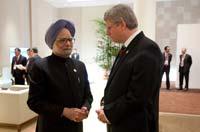Canadian companies upbeat about Asian investment

By Gurmukh Singh
India will join China in filling up Canadian stores with cheaper goods once New Delhi and Ottawa sign a free trade agreement to do away with many taxes and duties.
The prime ministers of the two countries announced the start of talks for a comprehensive economic partnership agreement during their meeting on the sidelines of the G20 summit in Seoul.
The two countries aim to push their trade more than three-fold from the current $4.2 billion in the next five years.
While main Canadian exports to India include machinery, fertilizers, wood pulp and vegetables, Indian exports comprise garments, metals, precious stones and jewellery, and electrical equipment.
Jarnail Singh, a BC businessman, welcomed the decision saying Canadians can expect to see more Indian-produced products on store shelves, and perhaps cheaper prices for items already imported from the Asian country.
“The agreement should be a boon for Indo-Canadian business owners, “ he said.
Trade between Canada and India totals about $4 billion, currently
A free trade agreement is expected to add about $6 billion each to the economies of the two countries.
But more than anything,Canadian banks and insurance companies will benefit immensely from a free trade pact with one of the fastest growing economies in the world. as they want access to the south Asian market.
After the global meltdown triggered by the US which is Canada’s main buyer, Ottawa is trying to lessen dependence on its big neighbour by signing free trade agreements with many other nations.
Economics experts here have described the talks with India as an “important development’’ for Canada.
Scotching fears that a free trade agreement will lead to more outsourcing of jobs to India, these analysts say this loss, if any, will be more than offset by Indian companies opening offices in Canada and creating jobs.
“But, with every free trade agreement comes worries that Canadians could lose jobs. We’ve already seen Canadian companies hiring Indian-based call centres to field customer inquires and that outsourcing could continue and even pick up.
After Canada’s ban on India after its 1974 and 1998 nuclear blasts, India-Canada relations have picked up after Ottawa reversed this policy by ending India’s nuclear isolation at the Nucelar Suppliers’ Group in 2008.
Apart from the nuke deal signed in June, Ottawa has also inked major agreements with India in mining, science and education and other fields.
The two countries have flirted with a trade agreement for years, before stepping up efforts of late. No timetable has been set for negotiations, however.
In recent months, Canada has been active in trade negotiations, as it seeks to diversify away from the increasingly wobbly U.S. economy. Negotiators are in the midst of a trade pact with the European Union that they hope to complete next year.
“This is a key milestone in our relationship. It demonstrates our increasing co-operation,” Prime Minister Stephen Harper said.
Canada’s free trade history with Asia has been rocky. Free trade talks with South Korea have quietly died because of irreconcilable differences over cars and Canadian beef. Talks announced years ago with Singapore have gone nowhere.
The Canada-India Free Trade talks come in the wake of a survey that Canadian companies are increasingly eyeing the mounting investment opportunities in India.
The Asian Investment Intentions Survey by the Asia Pacific Foundation of Canada (APF) found a strong rise of investment interest among Canadian companies into India, to 13 per cent in 2010 from eight per cent in 2005.
“While China remains the top investment market for Canadian companies, the economic might of the region as a whole is a growing reality that Canadian companies ought to explore and seize. Canadian firms are slowly latching onto these investment opportunities, especially in growing economies in India and Southeast Asia,” said APF Canada President and CEO Yuen Pau Woo.
The survey found that overall, Canadian companies remain upbeat about Asian investment opportunities. Despite the constraints of the recent financial crisis, over 50 per cent saw no impact or a gain in their Asian operations during the crisis.
More surprisingly, nearly 60 per cent saw an increase in revenue from Asian operations over the period of the crisis. The results echo the resilience of Asian economies in contrast to the ongoing economic turmoil affecting Europe and North America. Canadian companies remain generally confident about longer term increase in their level of investment in Asia. Some 55 per cent of companies are recognizing the shift of opportunity to service the growing markets in Asia, up five per cent from 2008.
This annual survey was conducted by the Asia Pacific Foundation of Canada between February and April 2010 among 504 companies with a 10.5 per cent response rate.
- with Mata Press Service









